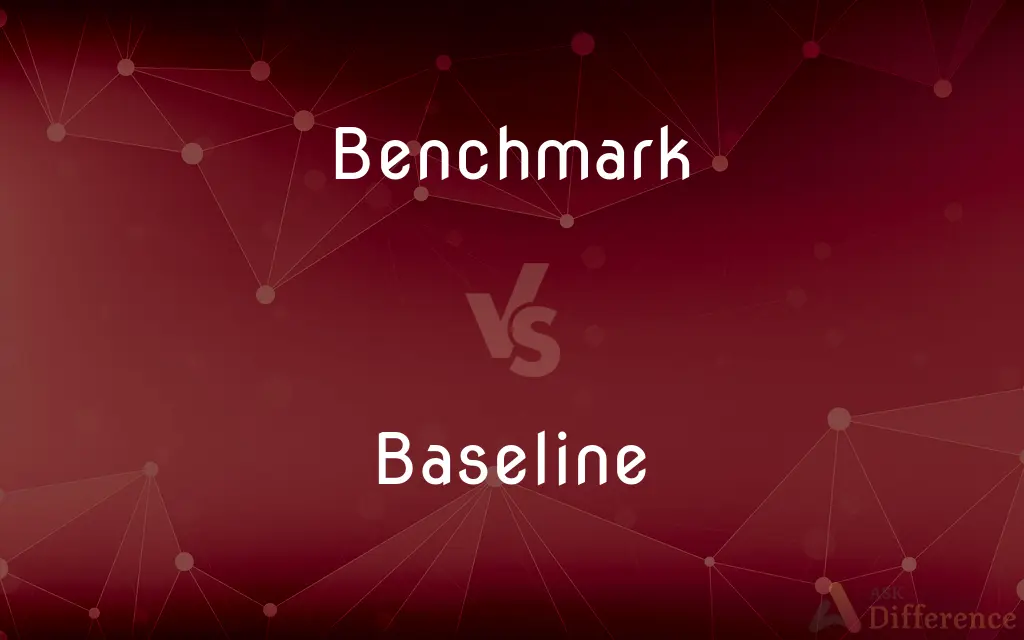Benchmark vs. Baseline — What's the Difference?
By Urooj Arif & Fiza Rafique — Updated on March 26, 2024
Benchmark is a standard or point of reference against which things can be compared, whereas Baseline refers to an initial set of conditions used as a point of comparison for later stages.

Difference Between Benchmark and Baseline
Table of Contents
ADVERTISEMENT
Key Differences
A benchmark serves as a reference point by which software, hardware, or an organization's performance can be measured or judged. It often involves comparison with best practices or industry standards to gauge performance or quality. In contrast, a baseline represents the initial conditions or performance levels of a system, project, or process, serving as a starting point for measuring change or improvement over time.
While benchmarks are used to establish performance standards and goals, comparing a current state to an industry standard or best practices, baselines are specifically focused on capturing the initial state of something before changes or improvements are made. This means that while benchmarks are often external references, baselines are internal and specific to the particular instance being measured.
In the context of project management, a baseline might be the original project plan, including the initial scope, timeline, and cost estimates, which future progress is measured against. Conversely, benchmarks in project management could involve comparing aspects of the project to similar projects within the industry to identify areas for improvement or to set performance targets.
Benchmarks are also critical in fields like computing, where they provide a means to compare the performance of different systems or components under a standard set of conditions. Baselines in this context might refer to the initial performance measurements of a system before optimization efforts are undertaken, allowing for a clear before-and-after comparison.
Ultimately, both benchmarks and baselines are essential tools for measurement and improvement. Benchmarks help set goals and aspirations based on external standards, while baselines help track progress and the effectiveness of changes from a known starting point.
ADVERTISEMENT
Comparison Chart
Definition
A standard for comparison with other entities or performance.
An initial set of conditions or performance level used for comparison over time.
Purpose
To compare against best practices or industry standards.
To measure change or improvement from a starting point.
Nature
Often external, based on industry-wide or best practices standards.
Internal, specific to the project, process, or system at hand.
Use in Improvement
Identifies targets for performance or quality enhancements.
Serves as a control point to assess the impact of changes made.
Context of Use
Used across industries for performance comparison and goal setting.
Used to document the initial state before the implementation of changes or new processes.
Compare with Definitions
Benchmark
A standard or set of standards used for comparison.
The company used industry benchmarks to evaluate their financial performance.
Baseline
The initial conditions or performance level serving as a reference point.
The project's baseline was established before the implementation phase began.
Benchmark
Helps organizations set performance goals.
Benchmarks in customer service excellence guided the team's improvement plan.
Baseline
To measure the effect of changes or progress over time.
Comparing current data with the baseline showed significant improvement.
Benchmark
Guides strategic decisions and improvements.
Benchmark analysis revealed areas where the company could reduce costs.
Baseline
Typically set at the beginning of a project or process and remains unchanged for comparison.
The baseline for the study was determined after the initial survey.
Benchmark
Can be updated as industry standards evolve.
Annual benchmarking reports help businesses stay aligned with current best practices.
Baseline
Enables clear assessment of progress and effectiveness of interventions.
The baseline study helped the team understand the project's early successes and challenges.
Benchmark
Widely used in assessing product quality, efficiency, or standards.
The new software was tested against the latest benchmarks to ensure its competitiveness.
Baseline
Used in project management, software development, and research.
Baseline measurements were critical for assessing the new policy's impact.
Benchmark
A standard by which something can be measured or judged
"Inflation ... is a great distorter of seemingly fixed economic ideas and benchmarks" (Benjamin M. Friedman).
Baseline
A line serving as a basis, as for measurement, calculation, or location.
Benchmark
Often bench mark A surveyor's mark made on a stationary object of previously determined position and elevation and used as a reference point, as in geologic surveys or tidal observations.
Baseline
Something, such as a set of data, used as a basis for comparison or as a control in a study
Took x-rays as a baseline for observing later arthritis.
Benchmark
To measure (a rival's product) according to specified standards in order to compare it with and improve one's own product.
Baseline
A starting point
Interviews with students provided the baseline of our project.
Benchmark
A standard by which something is evaluated or measured.
Baseline
(Baseball) The base path.
Benchmark
A surveyor's mark made on some stationary object and shown on a map; used as a reference point.
Baseline
The boundary line at either end of a court, as in basketball or tennis.
Benchmark
(computing) A computer program that is executed to assess the performance of the runtime environment.
Baseline
The area near this boundary line
Made a basket from the baseline.
Benchmark
(transitive) To measure the performance or quality of (an item) relative to another similar item in an impartial scientific manner.
Baseline
A style of play in tennis in which the player remains near the baseline and rarely approaches the net.
Benchmark
To give certain results in a benchmark test.
Baseline
A line that is a base for measurement or for construction.
A laser level generates a convenient baseline for interior work.
Benchmark
To use something (e.g., a competitor's product) as a standard to improve one's own thing.
Baseline
A datum used as the basis for calculation or for comparison.
We used the last doctor visit to provide baselines for vital statistics.
Benchmark
Any permanent mark to which other levels may be referred.
Baseline
(typography) A line used as the basis for the alignment of glyphs.
Several characters typically have descenders below the lower baseline.
Benchmark
Something serving as a standard by which related items may be judged; as, his painting sets the benchmark of quality.
Baseline
(tennis) The line at the farthest ends of the court indicating the boundary of the area of play.
The umpire missed the call. The ball hit the baseline.
Benchmark
A test or series of tests designed to compare the qualities or performance of different devices of the same type. Certain sets of computer programs are much used as benchmarks for comparing the performance of different computers, especially by comparing the time it takes to complete a test.
Baseline
(engineering) A configuration of software, hardware, or a process that is established and documented as a point of reference.
The baseline configuration includes unsupported components.
Benchmark
A standard by which something can be measured or judged;
His painting sets the benchmark of quality
Baseline
To provide a baseline for measurement.
Benchmark
A surveyor's mark on a permanent object of predetermined position and elevation used as a reference point
Baseline
(tennis) To play from the baseline.
Baseline
An imaginary line or standard by which things are measured or compared; as, they established a baseline for the budget.
Baseline
The back line at each end of a tennis court.
Baseline
The lines between bases on a baseball field along which a baseball player must run while running the bases.
Baseline
A measurement that represents the value of a physical quantity (such as a voltage, or a level of radioactivity) in the absence of effects from other variables in a measurement, test or experiment; a control value.
Baseline
Any horizontal line in a plot, graph, or diagram, or on a visual display in an electronic device, used as a reference point to which other values are referred.
Baseline
An imaginary line or standard by which things are measured or compared;
The established a baseline for the budget
Baseline
The back line bounding each end of a tennis or handball court; when serving the server must not step over this line
Baseline
The lines a baseball player must follow while running the bases
Common Curiosities
What is the importance of a benchmark?
Benchmarks are important for setting performance goals and standards by comparing against the best practices or industry averages.
Why are baselines crucial in project management?
Baselines are crucial for tracking project progress, budget adherence, and the overall success of project initiatives against the planned scope and timeline.
How is a baseline determined?
A baseline is determined by assessing the initial state or performance level of a project, system, or process before any changes are made.
Can benchmarks and baselines change over time?
Benchmarks can evolve with industry standards, while baselines typically remain constant to serve as a consistent point of comparison.
What is a common mistake when setting baselines?
A common mistake is failing to accurately capture all relevant initial conditions, leading to misleading comparisons over time.
How can benchmarks and baselines be used together?
They can be used together to measure current performance against both the initial state (baseline) and the industry standard or goal (benchmark).
Can benchmarks be customized?
Yes, benchmarks can be customized to fit specific organizational goals or project needs, though standard benchmarks are also widely used for general comparisons.
How do benchmarks benefit organizations?
Benchmarks benefit organizations by providing a target for improvement, enhancing competitive advantage, and identifying areas of underperformance.
What happens if a baseline is incorrectly set?
An incorrectly set baseline can lead to inaccurate measurements of progress and the effectiveness of changes.
How do external factors affect benchmarks and baselines?
External factors such as market trends, technological advancements, and regulatory changes can influence the relevance and accuracy of both benchmarks and baselines.
Are benchmarks applicable to all industries?
Yes, benchmarks can be adapted to any industry to compare performance, practices, and standards.
What is a baseline adjustment?
A baseline adjustment refers to the process of revising the baseline to account for significant changes or errors in the initial assessment.
What role does technology play in benchmarking and baseline setting?
Technology facilitates the collection, analysis, and comparison of data, making benchmarking and baseline setting more accurate and efficient.
How often should benchmarks be reviewed?
Benchmarks should be reviewed regularly to ensure they remain relevant and aligned with current industry standards and practices.
How do you select appropriate benchmarks?
Appropriate benchmarks are selected based on relevance, comparability, and the goal of achieving industry best practices or standards.
Share Your Discovery

Previous Comparison
Insulin vs. Glucagon
Next Comparison
Friendship vs. RelationshipAuthor Spotlight
Written by
Urooj ArifUrooj is a skilled content writer at Ask Difference, known for her exceptional ability to simplify complex topics into engaging and informative content. With a passion for research and a flair for clear, concise writing, she consistently delivers articles that resonate with our diverse audience.
Co-written by
Fiza RafiqueFiza Rafique is a skilled content writer at AskDifference.com, where she meticulously refines and enhances written pieces. Drawing from her vast editorial expertise, Fiza ensures clarity, accuracy, and precision in every article. Passionate about language, she continually seeks to elevate the quality of content for readers worldwide.
















































